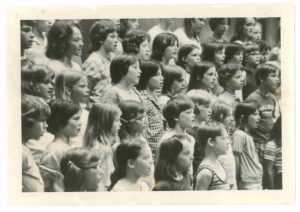“Next to the word of God, music deserves the highest praise. The gift of language combined with the gift of song was given to man that he should proclaim the Word of God through music.”-Martin Luther
God has given us the gift of music that we may worship Him TOGETHER in song. This is the very heart of corporate worship. Ephesians 5:19 states, “Speak to one another with psalms, hymns and spiritual songs. Sing and make music in your heart to the Lord.” Colossians 3:16 echoes the same statement, including a phrase about “teaching and admonishing” each other in corporate singing. These verses from the Bible remind us that our hearts as worshippers must be engaged in the words we are singing and that we must do this TOGETHER. The subjective beauty of the melody and the difficulty of the music are truly not what is important; the text and its direction toward God is the most integral part of this important part of worship.
If I asked you to tell me what your favorite hymn was you would, no doubt, have a story or a connection to a life event where that hymn was present. For many of us, “Amazing Grace” is such a hymn, providing a special, but probably sad, remembrance of a loved one’s funeral. My choir makes fun of me that I can quickly remember what others have shared as their favorite hymn. I remember those things because I try to connect a story to the person’s beloved hymn. I remember that Mr. Harold’s favorite hymn is “His Eye is on the Sparrow” because the text focuses on God’s care of the tiniest and most helpless creatures; a metaphor, perhaps, for the only child that he and his wife lost when she was only a few years old. I remember that Ms. Suzanne’s favorite hymn is, “In Christ Alone” because it was sung at her daughter’s wedding at Bonclarken. I remember that “There is a Fountain Filled with Blood” is Mr. Sam’s favorite because he seems so tied to the roots of the church he has been a member of his entire life. He listened to this revivalist hymn even as a child in the same pew where he now sits as an adult.
What makes us fall in love with a hymn? The text? The melody? The feeling we get when we sing it? Or do we focus on the hymn’s message and the power and strength of joining with a multitude of other voices to sing and reflect on its message? Perhaps we don’t think of the latter as much as we ought. Is this not what the verses in Ephesians and Colossians instruct us to do? Should we not truly be “iron sharpening iron”? Surely we all feel the presence of God when we pray together in a corporate setting. Should we not feel the same divineness when we SING together? Isn’t that what our psalm and hymn singing should be? It is another way to pray and focus our minds on the worship of our God. Comfort, strength, perseverance, peace…these are all things that are found in many of our hymns. Luther reminds us that the power of music is true and that it is a crucial and important part of our corporate worship.
In the Fall of 2007, our family’s world was rocked when my Uncle died suddenly at the age of 55 from a heart condition none of us were aware that he had. A beloved country veterinarian in rural Kentucky, he died on the side of the freeway pulled from his truck by my cousin’s best friend, a young vet student, who was shadowing him that day. Carter would later tell us, “It was as if your Uncle breathed into this world and breathed out in the next.” Our shocked family gathered at the Baptist church in Shelbyville days later to say goodbye to this incredible Christian man who had been a witness to so many. The visitation was hours long as the line of people whose lives he had touched continued to stretch far beyond the back door of the church. Later, at the cemetery, my brave Aunt began to finally show the cracks of what had transpired in the previous days. Not able to bear the sight of the casket being lowered in the ground, she turned to her best friend for solace. The other woman engulfed her in her arms and began to sing, “whatever my lot, thou hast taught me to say; it is well, it is well with my soul”. Soon the singing spread as one by one we joined her and quickly we were all joining in the refrain of this most powerful hymn. I had heard this hymn before but I felt as if I had never truly heard its message. There, in that cemetery, the corporate worship we had as we joined our hearts in song was intent on believing the message of that hymn. We found strength in its message. I heard that hymn in a new light that day. We were thirsty for solace, we were thirsty for the hope outlined in this hymn. The Bible does not promise that our lives will be easy…in fact, it warns us that our way will be paved with many trials. In that moment, life did not make sense to our family. The story behind that hymn is even more tragic; I invite you to do your own research if you do not know its tale. However, the hymn writer was able to boldly say that this was God’s plan. Through the measures of that hymn, he was able to find acceptance and hold to the belief of God’s perfect plan, even in the midst of tragedy.
This past year I have enjoyed going and speaking to different ARP women’s groups about the stories behind our most well-known and loved hymns. A common thread that seems to run through the stories of the development of many of our hymns is the distress and trials of the hymn writer. The words we know by heart from refrains and verses were written by those who experienced such strife in their life. Could knowing the inspiration behind these hymns color the way we sing them in worship? I believe we can look to our hymns to provide truth and inspiration for our walk through this Christian journey. There are many books you can find that tell the stories of these hymns. Have you ever considered using hymns as a meditation or prayer? Our family uses hymns as devotionals, especially when we are all together at Christmas. In her most famous hymn, “Blessed Assurance”, Fanny Crosby, known as “America’s Hymn Queen” , writes, “This is my story, this is my SONG, praising my Savior all the day long!” Could we not feel some connection to the sentiment that was present at the creation of a hymn and would this not truly bond us as worshipful Christians? How much stronger are we when we sing together?
Recently, I had the honor of seeing three of my wonderful voice students graduate from Winthrop University. As a special remembrance, I bought them each a journal and wrote a Bible verse in the front. I jotted down a favorite verse from Zephaniah 3:17, “The Lord your God is with you, the mighty warrior who saves. He will take great delight in you; in His love He will no longer rebuke you, but rejoice over you with singing.” This verse shows God singing over us with delight. He is not speaking…He is SINGING. How could we choose NOT to sing to Him? How much more should our delight be in Him for everything He is to us? Our praises seem so inadequate and unworthy of such a great God, but how could we choose NOT to SING?
I admit that I get a bit frustrated when I look out in our sanctuary and see people holding hymnals but not moving their mouths and joining in the psalms and hymns that we include in worship. What would Martin Luther think of this? I’ve spoken to some in my congregation who say, “I don’t have a good voice”, “I don’t like to sing”, or, my least favorite, “Mrs. Smith told me in the 5th grade that I couldn’t sing, so I don’t.” God cares not for the beauty of our voice…in fact, I think every voice that raises praise to Him is pleasing and a right and acceptable form of praise. He needs to hear us SINGING over Him and taking delight in all He does for us, as the verse in Zephaniah reminds us. And, when you make that joyful noise, pay close attention to the text of the hymn or psalm you are singing, for in it you may find “strength for today and bright hope for tomorrow”, as the hymn writer reminds us.
Dr. Kristen Wunderlich is the Associate Professor of Voice at Winthrop University in Rock Hill, SC. She is also the Music Director for First ARP Church in Lancaster, SC.

